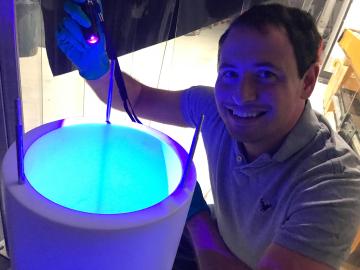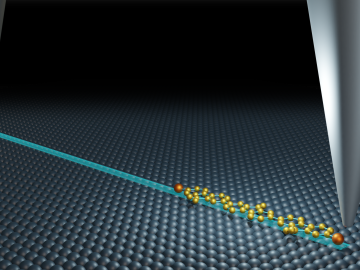
Filter News
Area of Research
- (-) Materials (115)
- (-) Materials for Computing (19)
- Advanced Manufacturing (11)
- Biology and Environment (79)
- Biology and Soft Matter (1)
- Building Technologies (2)
- Computational Biology (2)
- Computational Engineering (2)
- Computer Science (5)
- Electricity and Smart Grid (1)
- Energy Science (155)
- Energy Sciences (1)
- Functional Materials for Energy (1)
- Fusion and Fission (10)
- Fusion Energy (3)
- Isotope Development and Production (1)
- Isotopes (3)
- Materials Characterization (1)
- Materials Under Extremes (1)
- Mathematics (1)
- National Security (16)
- Neutron Science (127)
- Nuclear Science and Technology (12)
- Quantum information Science (1)
- Supercomputing (78)
- Transportation Systems (2)
News Topics
- (-) High-Performance Computing (4)
- (-) Materials Science (93)
- (-) Molten Salt (3)
- (-) Neutron Science (38)
- (-) Transportation (19)
- 3-D Printing/Advanced Manufacturing (27)
- Advanced Reactors (4)
- Artificial Intelligence (9)
- Big Data (2)
- Bioenergy (12)
- Biology (5)
- Biomedical (9)
- Buildings (5)
- Chemical Sciences (36)
- Clean Water (3)
- Composites (10)
- Computer Science (24)
- Coronavirus (7)
- Critical Materials (13)
- Cybersecurity (4)
- Energy Storage (38)
- Environment (16)
- Exascale Computing (2)
- Frontier (3)
- Fusion (7)
- Grid (5)
- Irradiation (1)
- Isotopes (14)
- ITER (1)
- Machine Learning (5)
- Materials (83)
- Mathematics (1)
- Microscopy (31)
- Nanotechnology (46)
- National Security (4)
- Nuclear Energy (16)
- Partnerships (11)
- Physics (28)
- Polymers (23)
- Quantum Computing (4)
- Quantum Science (14)
- Security (3)
- Simulation (2)
- Space Exploration (3)
- Summit (3)
Media Contacts

Oak Ridge National Laboratory scientists demonstrated that an electron microscope can be used to selectively remove carbon atoms from graphene’s atomically thin lattice and stitch transition-metal dopant atoms in their place.

On Feb. 18, the world will be watching as NASA’s Perseverance rover makes its final descent into Jezero Crater on the surface of Mars. Mars 2020 is the first NASA mission that uses plutonium-238 produced at the Department of Energy’s Oak Ridge National Laboratory.

Collaborators at Oak Ridge National Laboratory and the University of Tennessee Health Science Center are developing a breath-sampling whistle that could make COVID-19 screening easy to do at home.

The COHERENT particle physics experiment at the Department of Energy’s Oak Ridge National Laboratory has firmly established the existence of a new kind of neutrino interaction.


Oak Ridge National Laboratory’s Center for Nanophase Materials Sciences contributed to a groundbreaking experiment published in Science that tracks the real-time transport of individual molecules.

Marcel Demarteau is director of the Physics Division at the Department of Energy’s Oak Ridge National Laboratory. For topics from nuclear structure to astrophysics, he shapes ORNL’s physics research agenda.

In the quest for advanced vehicles with higher energy efficiency and ultra-low emissions, ORNL researchers are accelerating a research engine that gives scientists and engineers an unprecedented view inside the atomic-level workings of combustion engines in real time.

Six scientists at the Department of Energy’s Oak Ridge National Laboratory were named Battelle Distinguished Inventors, in recognition of obtaining 14 or more patents during their careers at the lab.

Oak Ridge National Laboratory researchers have developed a new family of cathodes with the potential to replace the costly cobalt-based cathodes typically found in today’s lithium-ion batteries that power electric vehicles and consumer electronics.


